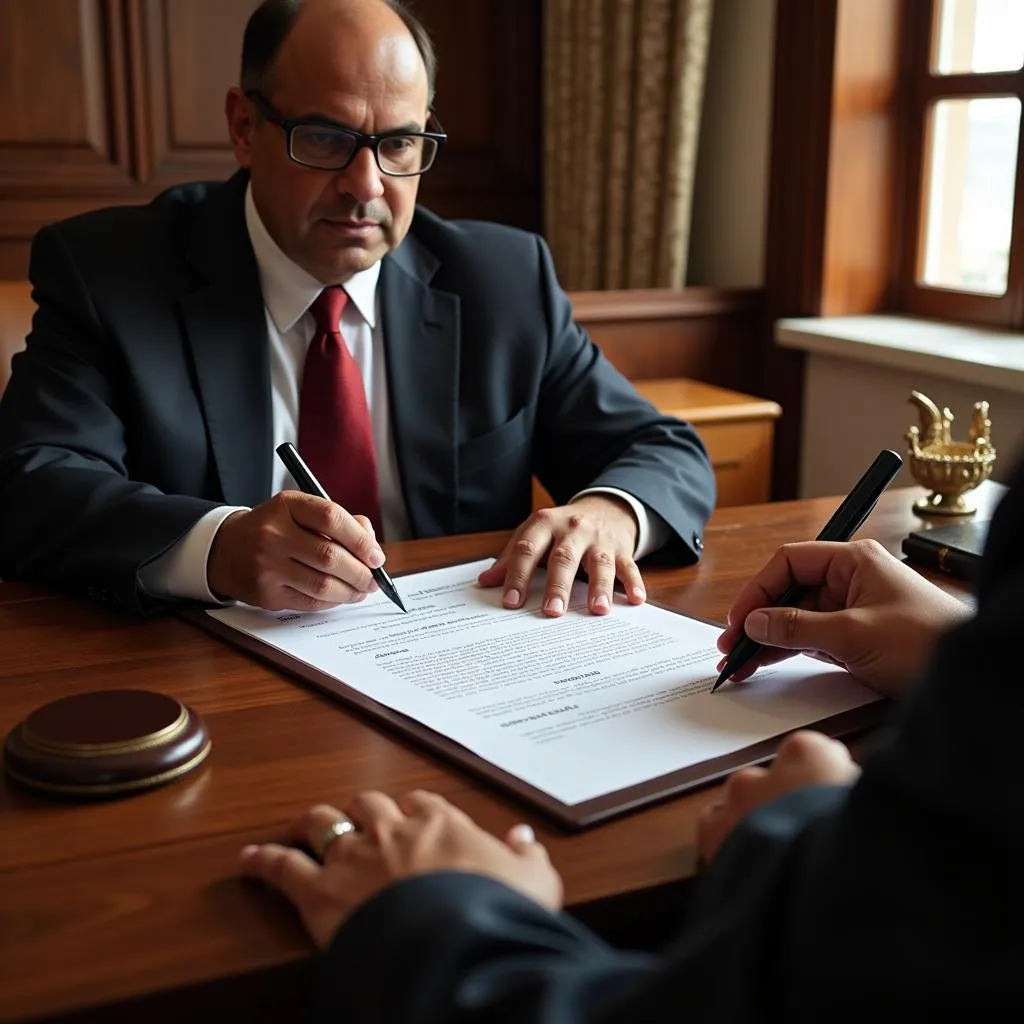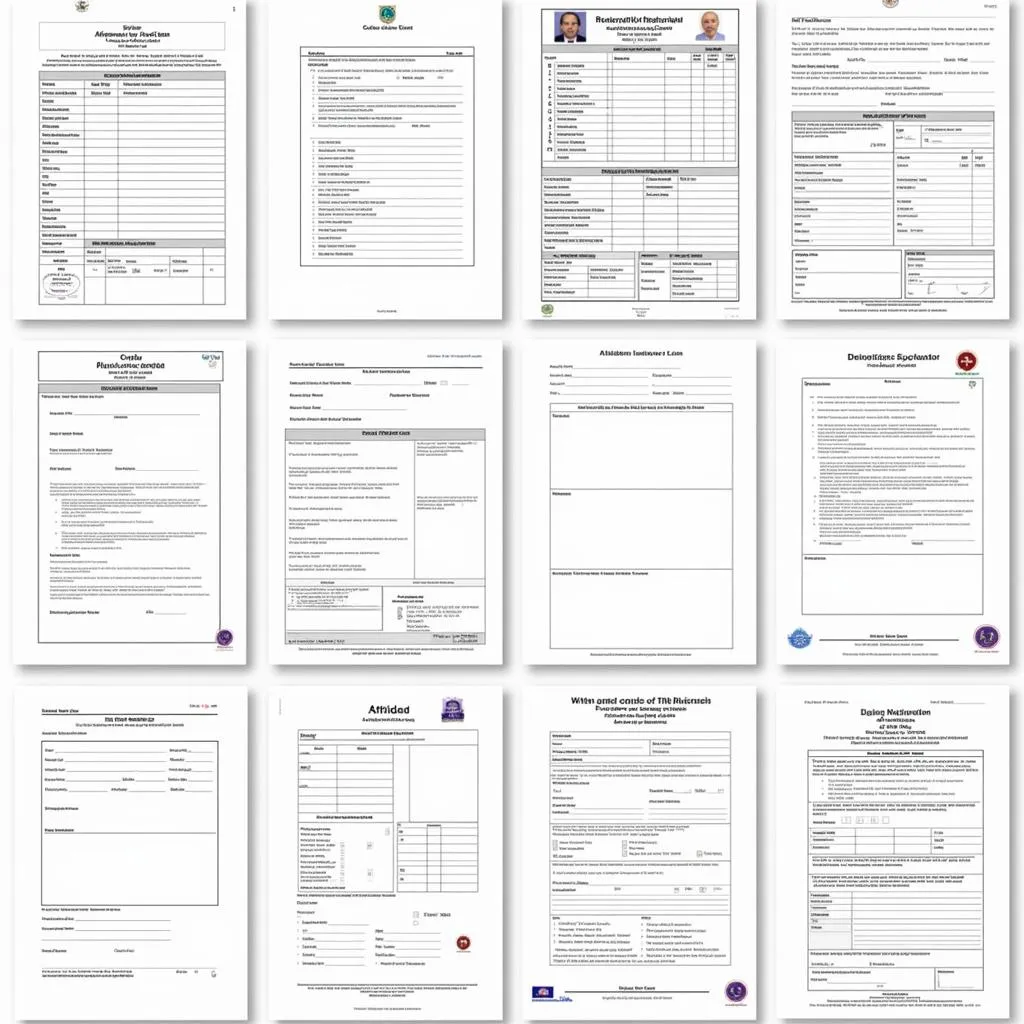An affidavit in Pakistan plays a crucial role in legal and administrative processes. It serves as a sworn statement, providing evidence and supporting claims in various situations. This comprehensive guide explores the intricacies of affidavits in Pakistan, shedding light on their purpose, types, drafting process, and legal implications.
What is an Affidavit in Pakistan?
An affidavit is a written document containing a declaration of facts, made voluntarily and confirmed by the oath or affirmation of the person making it, known as the deponent. It holds legal weight and is admissible as evidence in Pakistani courts.
 Affidavit Signing Ceremony in Pakistan
Affidavit Signing Ceremony in Pakistan
Why are Affidavits Important in Pakistan?
Affidavits are indispensable in Pakistan’s legal system for several reasons:
- Evidence: They serve as prima facie evidence, meaning they are presumed true unless proven otherwise.
- Supporting Claims: Affidavits substantiate claims made in petitions, applications, or legal proceedings.
- Verification: They verify facts and information, ensuring accuracy and authenticity.
- Legal Proceedings: Courts rely on affidavits for evidence in various cases, from property disputes to family matters.
Types of Affidavits Commonly Used in Pakistan
Pakistani legal practice utilizes various types of affidavits, each tailored to specific purposes. Some common ones include:
- Affidavit of Identity: Confirms an individual’s identity and is often required for document verification.
- Affidavit of Loss: Declares the loss of important documents, such as identity cards or educational certificates.
- Affidavit of Support: Pledges financial support, typically used in visa applications.
- Affidavit of Marriage: Confirms the legitimacy of a marriage, particularly for immigration or inheritance purposes.
 Variety of Affidavit Forms in Pakistan
Variety of Affidavit Forms in Pakistan
How to Draft an Affidavit in Pakistan
Drafting an affidavit in Pakistan requires careful attention to content and format. Here’s a step-by-step guide:
- Heading: Clearly state “Affidavit” at the top and center of the page.
- Identification of Deponent: Provide the full name, father’s name, address, and CNIC number of the person making the affidavit.
- Court Details (If Applicable): Mention the court’s name and case details if the affidavit is for a specific legal proceeding.
- Statement of Facts: Present a clear, concise, and chronological account of the facts being declared. Each paragraph should cover a separate point and be numbered.
- Verification: Include a statement at the end, confirming that the contents of the affidavit are true and correct to the best of the deponent’s knowledge and belief.
- Signature and Attestation: The deponent must sign the affidavit in the presence of an Oath Commissioner or Notary Public, who will then attest it.
Legal Implications of a False Affidavit in Pakistan
Submitting a false affidavit in Pakistan has serious legal consequences, including:
- Perjury: Making false statements under oath is a criminal offense punishable by law.
- Contempt of Court: A false affidavit can be deemed as contempt of court, leading to penalties.
- Damage to Credibility: The deponent’s credibility is severely compromised, potentially impacting future legal matters.
Frequently Asked Questions about Affidavits in Pakistan
1. What is the cost of getting an affidavit notarized in Pakistan?
Notarization fees can vary based on the Oath Commissioner or Notary Public.
2. Can I draft an affidavit myself?
While you can draft it yourself, consulting a legal professional ensures accuracy and compliance with legal requirements.
3. How long is an affidavit valid in Pakistan?
An affidavit’s validity depends on its purpose and the nature of the facts declared. Some affidavits have specific validity periods, while others remain valid indefinitely unless revoked.
4. Can I use an affidavit from Pakistan in another country?
The recognition of Pakistani affidavits in other countries depends on their respective laws and regulations. In many cases, additional legalization or authentication may be required.
5. What is the difference between an affidavit and a statutory declaration in Pakistan?
While both involve sworn statements, the main distinction lies in the authority before whom they are made. Affidavits are sworn before an Oath Commissioner or Notary Public, while statutory declarations are made before individuals authorized by specific laws to administer oaths for particular purposes.
Need Assistance with Affidavits in Pakistan?
Navigating the complexities of legal documentation like affidavits can be challenging. If you require any assistance regarding affidavits in Pakistan, our team of experts is here to help.
Contact us at:
Phone: +923337849799
Email: news.pakit@gmail.com
Address: Dera Ghazi Khan Rd, Rakhni, Barkhan, Balochistan, Pakistan
We offer 24/7 customer support to address your queries and provide guidance throughout the process.
You May Also Be Interested In:
- Stamp Paper Pakistan PDF – Learn more about the importance of stamp paper in legal documentation in Pakistan.